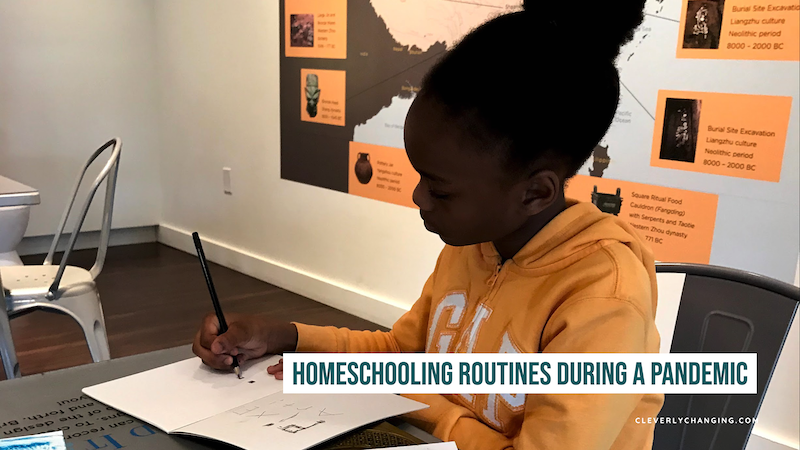As working parents, is it really feasible to “homeschool” our children?
Yes, many parents who homeschool also work fulltime or part-time. For parents who work, typically most homeschooling routines include using co-ops, tutorials, or tutors to supplement their child’s education.
During the pandemic, however, parents who are working can try to get up earlier to work before their children wake up or assign lighter tasks or projects that can be completed without parental guidance. Another option is to work throughout the day and do schooling in the evenings.
Homeschooling is different for every household, us homeschoolers become accustomed to doing what is best for us.
What are the time commitments for homeschooling?
The answer to this question varies based on age, curriculum, and expectations.
Prior to the closure of schools due to the pandemic the state of MD required 7 subjects be taught regularly.
The main subjects are English/Reading, Mathematics, Science, Social Studies, Art, Music, Physical Education, Health, and a Foreign Language.
Check out this post from my friend Eva who has high school age students “Are You Ready for COVID-19? Here’s a Guide to Emergency Homeschooling.”
What would a typical Homeschooling Routines / Schedule look like?
This answer really depends on the household.
However, I can give you a general idea of what works for others. As a rule of thumb when homeschooling we are not trying to recreate a school’s daily schedule at home. To do so, may overwhelm the typical parent. However, you should set the expectations of your children by creating a schedule or guide for your home.
When my children were younger, I was much more rigid and felt like they needed a lot of structure. Here is a real copy of our old schedule.
I give my girls much more autonomy now that they are older. Now, our schedule looks more like this:
- 10:00am – Breakfast and devotion
- 10:30am – Math / Science / STEM
- 11:15am – Social Studies / Art / Music
- 11:45am – Vocabulary/Spelling
- 12:00 – Lunch/Health
- 12:30 – Physical Education
- 1:00pm – History / Coding
- 1:30pm – Fine arts / Foreign Language
- 2:00pm – Writing / English / Reading
Here’s the template I use to create my lesson plans:

Khan Academy has created sample schedules by age groups that you can adopt as your own too.

How long should kids be working?
When creating homeschooling routines, children can be given projects and activities throughout the day, but I recommend creating actual daily, or weekly lesson plans. Children know when you don’t know what you’re doing so have a plan. If the school gave a syllabus or work, start there.
Are there different laws depending on states regarding homeschooling? Every state has different homeschool laws. I have only homeschooled under Maryland guidelines so I am most familiar with the laws here.
Must it be a parent who is doing the schooling (in MD)?
Ideally, the state wants a parent to be the primary teacher, but they allow online curriculums, tutors, etc. Check out Comar for up-to-date guidelines.
Learn more here:
Questions Asked About Homeschooling
How to Get Started Homeschooling Maryland
Homeschooling: This Is How We Do it
Listen to this Podcast where my husband shares his thoughts: Homeschooling as a Family – Episode 13
What are some resources for information and activities or groups?
Check out this blog post that breaks down resources parent can implement in their daily homeschooling routines (organized by subject): Vetted Home Educational Resources by Subject here
Here are four of my favorites:
- TEDed – Multiple Subjects for ages 8-18
- Brain Pop – Multiple Subjects for K-12
- Khan Academy– Multiple Subjects for K-12
- CK12 – Multiple Subjects for K-12
Tips to help our children and parents emotionally
- Eat healthy whole foods.
- Establish a time for everyone to drop everything and pray
- Practice 10-seconds of deep breathing
- Implement a 15-30 minute quiet time.
- Go outside and walk, exercise, or play
- If needed make an appointment for a therapy telemedicine visit with a professional
- Take dance breaks.
- Listen to music without words.
- Journal – express emotions and write down feelings.
- Cook or bake something like cookies, cake, or pie. The smell of sweets baking is like aromatherapy.
- Establish a time to see friends via Skype, Facetime, Zoom, etc.
- Create a gratitude jar.
- Create a jar for things that upset you and at the end of the day about those things.
Tools to block certain websites so your children can work online without distraction.
StayFocusd is an extension available on the Google Chrome web browser.
Limit is a Google Chrome browser extension that limits time spent on distracting websites.
SelfControl is a free and open-source application for macOS devices that lets you block your own access to distracting websites.

